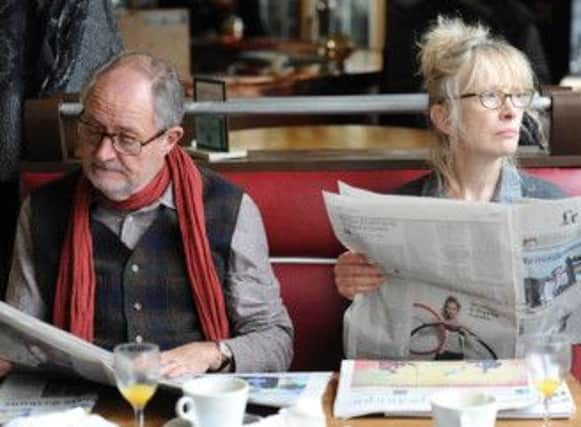Film review: Le Week-End


Le Week-End (15)
Director: Roger Michell
Running time: 93 minutes
* * * *
The bickering starts in earnest when she sees their drab hotel, and insists they check out and find a more glamorous place that they cannot afford. Despite the romantic upgrade however, when he tries to resuscitate their sex life, she rejects the pawing. “Your vagina has become something of a closed book,” mourns Broadbent, incidentally demonstrating that he can still jolt a press audience into a collective sharp intake of breath.
Le Week-End is also about another partnership, Roger Michell and Hanif Kureishi, who have collaborated on a series of modestly budgeted, emotionally ambitious films over the past ten years, all reflecting on love, desire and betrayal past pension age. This triptych began in 2003 with The Mother, where Anne Reid’s grandmother falls for a pre-Bond Daniel Craig, who is half her age. In 2006 Peter O’Toole vainly craves the vitality of connecting with twentysomething Jodie Whittaker in Venus. In Le Week-End, the leads are more evenly matched: a couple both heading towards 60, and whose relationship has been eroded by 30 years of resentments.
Advertisement
Hide AdThat’s because this is a Kureishi script. Once upon a time he was an avatar of youthful rebellion, but now he seems intrigued by rebels of all ages, and relationships which habitually lean on pain, thoughtlessness, exasperation and crude honesty. Nick and Meg have a grown son who sponges off them, unsatisfying teaching jobs, and a constant nag of unfulfilment. Nick is waiting for the right moment during this break to tell Meg he has been forced into early retirement by his university, after inappropriate remarks made to one of his students. Meg is drawn to making some radical life changes, which may not include Nick.
Shared values keep them together, especially a shared sense of humour. Tensions can dissipate into giggles, and watching them can also be pretty funny, even when the circumstances are at their most mortifying. The catalyst is a chance encounter with an old university friend (Jeff Goldblum), who is now rich, successful, highly sexed with a besotted wife. In other words, he is everything that Nick isn’t. He’s also hilarious in the best Goldblum manner, which is to say hip, lizardly and distracted.
Like earwigging on some domestic discontent at the next table, the banter can feel thrillingly transgressive; a geriatric attempt to do a runner from a restaurant bill is one highpoint, a drunken dinner party confession of inadequacy is another. The upshot is a perfectly calibrated essay on a very British form of hope and foolishness. She’s impulsive, propulsive and compulsively restless. He’s steadier, but more despairing. If this was a Bergman picture, that alone would sustain three acts and a chilly Scandinavian sunset but Nick and Meg are more hectic, earthier and sturdier than that. Unassuming but authentic, Le Week-End makes Before Midnight’s Julie Delpy and Ethan Hawke look like Terry and June. n
Twitter @SiobhanSynnot
On general release from Friday.